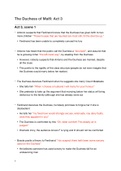The Duchess of Malfi: Act 3
Act 3, scene 1
- Antonio suspects that Ferdinand knows that the Duchess has given birth to two
more children “Those houses that are haunted are most still, till the devil be up."
• Ferdinand has been unable to completely conceal his fury
- Antonio has heard that the public call the Duchess a “strumpet”, and assume that
he is growing richer “the left-hand way”, by stealing from the Duchess
• However, nobody suspects that Antonio and the Duchess are married, despite
all the clues
• This points to the rigidity of the class structure (people do not even imagine that
the Duchess would marry below her station)
- The Duchess deceives Ferdinand when he suggests she marry Count Malateste
• She tells him “When I choose a husband I will marry for your honour.”
• She pretends to take up the argument that marrying below her status will bring
dishonour to the family (although she has already done so)
- Ferdinand deceives the Duchess, he falsely promises to forgive her if she is
disobedient
• He tells her “my fixed love would strongly excuse, extenuate, nay deny faults,
were they apparent in you”
• The Duchess is comforted by this “Oh, blest comfort! This deadly air is
purged.”
• Dramatic irony, the audience knows F is lying and D should not be comforted
- Bosola posits a theory to Ferdinand “I do suspect there hath been some sorcery
used on the Duchess”
• He believes someone has used sorcery to make the Duchess fall for an
undeserving man
1
, • Bosola has a superstitious side to him, unsurprising following his use of
apricots to induce labour
• Ferdinand dismisses B’s explanation of sorcery, saying “The witchcraft lies in
her rank blood”
• F believes her faults are simply due to her bad nature, the double meaning of
“rank” can imply either disgust or a reference to her status
- Ferdinand’s request for the key to the Duchess’s bedchamber would have struck
Jacobean audiences as very inappropriate
- Bosola is unafraid to criticise Ferdinand
• B tells him “you grossly flatter yourself”
• Ferdinand thanks him for his honesty, and says that he is glad that Bosola is
not another of the “flatterers”
Act 3, scene 2
- We can see how Antonio and the Duchess’s romance has developed, they make
light-hearted jokes and conversation
• Cariola jokes that D tosses and turns while sleeping “she’s the sprawlingest
bedfellow”
• Antonio still wishes to stay in her bed “I shall like her the better for that”
• Antonio jokes that sleeping with D is work, he is a “labouring” man and
sleeping with her is a “task”, this is another light-hearted joke but it also
reminds us of his lower class and recalls the fact that he is technically her
steward
- Antonio tries to encourage Cariola to marry by using transformation imagery from
Ovid’s “Metamorphosis”
• He praises women who are sexually and romantically yielding to men, saying
that they are turned into “flowers, precious stones or eminent stars”
• He warns that women are punished for denying their lovers, giving the example
of “Daphne” who became a “fruitless bay tree”
2





